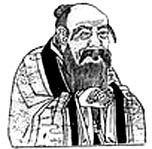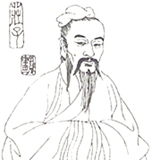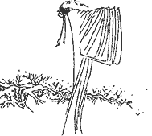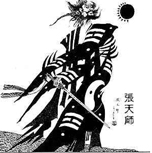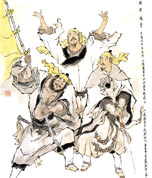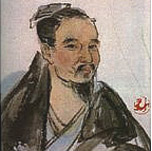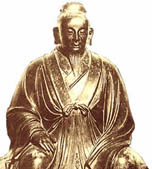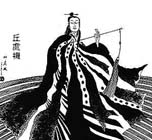Laozi
He was the first philosopher of Chinese Taoism in the 6th century BC. He is traditionally named as the author of the
Daodejing, though modern scholars say that the work had more than one author. Legends about his life abound, but little or no certain information survives. The historical Laozi, if he existed, may have been a scholar and caretaker of sacred books at the royal court of the Zhou Dynasty. According to legend, he was carried 72 years in his mother's womb, and he met Confucius as a young man. He is venerated as a philosopher by the Confucianists, as a saint or god by the common people of China, and as a divinity and the representative of the Tao by Taoists.
Zhuangzi
Zhuangzi (369–286 BC) was a native of the state of Meng, on the border of present-day Shandong and Henan provinces, and is said to have lived as a hermit. The collection of essays attributed to him, called the Chuang-tzu, is distinguished by its brilliant and original style, with abundant use of satire, paradox, and seemingly nonsensical stories. Zhuangzi emphasizes the relativity of all ideas and conventions that are the basis of judgments and distinctions; he puts forward as the solution to the problems of the human condition freedom in identification with the universal Tao, or principle of Nature. He is less political in his orientation than the earlier Taoist Laozi. He is also called Chuang Chou.
Liezi
Lie Yukou is considered the author of the Taoist classic Liezi, which uses his honorific name. Since there is little historical evidence of Lie Yukou as a Hundred Schools of Thought philosopher during the Warring States Period, some scholars believe that the Zhuangzi invented him as a Taoist exemplar.
Zhang Daoling
Zhang Daoling, (34 - 156 AD) was the founder and first patriarch of organized religious Taoism. Zhang composed a Taoist work that attracted many followers among Chinese and indigenous groups in Sichuan. Like contemporary Taoists, he promised longevity and physical immortality, but, unlike others, he emphasized the importance of religious organization. He founded the Five Pecks of Rice movement. Zhang, his son, and his grandson are known as the Three Zhangs. While the Daodejing was the basic text, Zhang's Xiang'er commentary interpreted it to suit the organization's needs.
Zhang Jiao
Zhang Jiao (140 - 188 AD) was the leader of the Yellow Turbans during the period of the late Eastern Han Dynasty in China. He was said to be a sorcerer, and was a follower of Taoism. Giving himself the title of "Great Teacher,” he led the Yellow Turban Rebellion with his younger brothers Zhang Bao and Zhang Liang in a campaign called "The Way of Heaven" or "The Way of Peace." The Yellow Turbans claimed to be Taoists, and rebelled against the Han because of the high taxes placed against them. It is said that Zhang Jiao is the grandson of the founder of the Tianshi (Celestial Masters) Sect of Taoism, Zhang Daoling.
Wang Bi
Wang Bi (226 - 249 AD) was a Chinese philosopher. His most important works are commentaries on Laozi's Daodejing and the Yijing. The text of the Daodejing that appeared with his commentary was widely considered as the best copy of this work until the discovery of the Mawangdui texts in 1973.
Ge Hong
Ge Hong, (283 - 343 AD) was a Chinese alchemist and Taoist philosopher. He received a Confucian education but later became interested in the Taoist cult of physical immortality. His writings blended the occult doctrines of Taoism with the ethics of Confucius. His major work, Baopuzi, discusses alchemy, diet, sexual hygiene, and meditation as well as the importance of ethical principles.
Zhang Sanfeng
Zhang Sanfeng, was a semi-mythical Chinese Taoist priest who is believed by some to have achieved immortality, said variously to date from either the late Song Dynasty, Yuan Dynasty, or Ming Dynasty. His name is said to have been Zhang Junbao before he became a Taoist. As a legendary culture hero, Zhang Sanfeng is credited by modern practitioners as having originated the concepts of neijia; soft, internal martial arts, specifically taijiquan, as a result of a Neo-Confucian syncretism of Chan Buddhist Shaolin martial arts with his mastery of Taoist Tao Yin (neigong) principles. He is also associated in legend with the Taoist monasteries at the Wudang Mountains in Hubei Province.
Qiu Chuji
Qiu Chuji (1148 - 1227 AD) was a Taoist and alchemist. His disciple Li Zhichang chronicled Qiu's journey to meet Genghis Khan who wished to learn from Qiu in The Travels of an Alchemist, which describes the land and people between the Great Wall and Kabul and between the Yellow and Aral seas. Qiu Chuji was a member of a Quanzhen sect known for its extreme asceticism and for the doctrine of xingming, which held that humanity's lost natural state could be recovered through prescribed practices.
(China.org.cn April 20, 2007)

